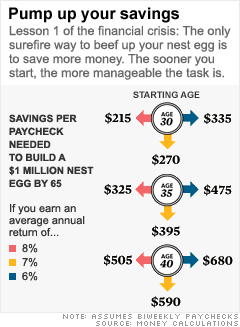How to play by the new money rules
The shakeup in the financial system has changed the rules of managing your money. Here's a shorthand look at how to use the new rules to build wealth for your family, no matter how old you are.

- Buy a home ASAP to begin building equity (aim to put at least 10% down).
- Stash enough in your 401(k) to get the company match, and tilt it heavily toward stocks for growth.
- Start funding a 529 college savings plan as soon as kids arrive.
- Leverage is out; saving more to meet your goals is in.
- Don't count on supersize gains in stocks and real estate going forward.
- Expect the market's sharp zigs and zags to continue.
Buy that house - if you plan to stay. In the long run, housing prices should keep just slightly ahead of inflation; in the short run, they may drop even more. Moving in less than five years? Maybe you should keep renting - you may not make enough on a home sale to cover your broker's fee and other costs.
Save for a hefty down payment. If you are ready to buy, you'll need to put down at least 20% to make a deal. More money down, along with a 720-plus credit score, will help you nab the best mortgage rate.
Go all out for retirement. Investing just enough for the company match doesn't cut it. Push yourself to the limit: $16,500 for a 401(k); $5,000 in an IRA.
Smooth the roller-coaster ride. Yes, stocks are key for long-term growth. But to dampen volatility, you need a blend of assets - large- and small-cap stocks, foreign shares, and different fixed-income investments - that typically shine at different times. (Last year's across-the-board debacle was a rare occurrence).
Set priorities. Can't max out the 401(k) and fund a 529? Retirement comes first. If needed, pay for college with a combo of your salary, scholarships, and loans.
NEXT: Stage 2: The peak years
Last updated March 24 2009: 2:45 PM ET

